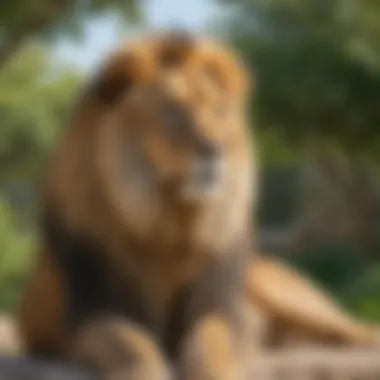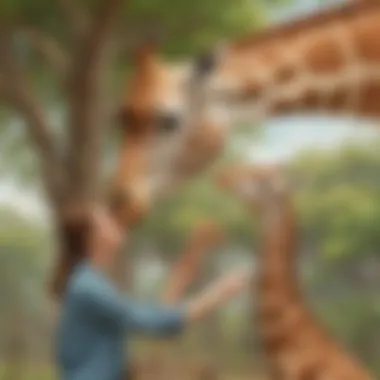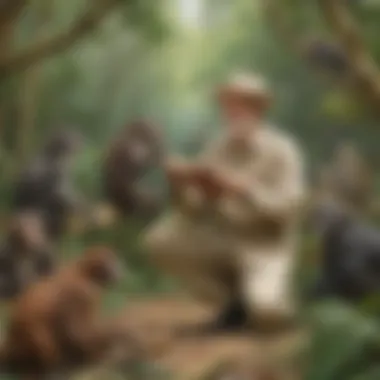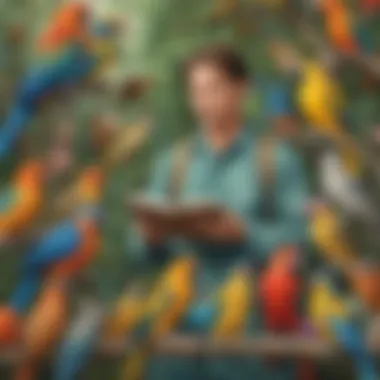The Path to Becoming a Zookeeper: A Detailed Guide for Animal Care Enthusiasts


Science Fun Facts
Becoming a zookeeper can be an enthralling journey for those passionate about animal welfare. From learning about various species to understanding their behaviors, aspiring caretakers embark on a rewarding path of conservation and education, fostering a deep connection with the natural world around us.
Discover the Wonders of Science
One of the fascinating aspects of becoming a zookeeper is the opportunity to explore the intersection of biology, ecology, and animal psychology. Through hands-on experiences and academic studies, individuals delve into the intricate web of life, discovering the complexities and wonders of the animal kingdom.
Science Quiz Time
To test your knowledge and understanding of the animal world, interactive quizzes provide an entertaining way to reinforce key concepts. From identifying species to comprehending conservation strategies, engaging in brain-teasers and puzzles enhances critical thinking skills essential for aspiring zookeepers.
Science Experiment Showcase
Engaging in fun and educational experiments not only offers practical insights but also cultivates a sense of responsibility towards animal welfare. By following step-by-step instructions, preparing materials, and adhering to safety precautions, individuals gain a hands-on understanding of the scientific principles underpinning zookeeping practices.
Introduction
In the realm of animal care and conservation, the role of a zookeeper stands as a key pillar in ensuring the well-being of diverse species. This introductory section sheds light on the pivotal responsibilities, intrinsic skills, and essential qualities required by those aspiring to embark on this meaningful journey of becoming a zookeeper.
Understanding the Role of a Zookeeper
When delving into the manifold responsibilities of a zookeeper, it becomes evident that their tasks extend far beyond mere animal care. The daily duties entail not only feeding and observing the animals but also monitoring their health, implementing enrichment activities, and contributing to conservation efforts. Understanding the essence of animal welfare forms the crux of a zookeeper's mission, ensuring that each creature under their watchful eye experiences a life free from distress and filled with enrichment.
Responsibilities of a Zookeeper
At the core of a zookeeper's role lies the profound responsibility of catering to the physical and emotional needs of the resident animals. From administering specialized diets to designing stimulating environments, every action taken shapes the well-being of the wildlife. The meticulous attention to detail and compassionate care provided by zookeepers play a vital role in safeguarding the welfare of the animal inhabitants, fostering a space where both learning and conservation thrive.
Importance of Animal Welfare
The paramount significance of animal welfare within the realm of zoos cannot be overstated. It serves as the guiding principle that dictates every decision made by zookeepers, shaping protocols to prioritize the comfort and flourishing of their charges. By upholding stringent standards of animal welfare, these dedicated caretakers not only ensure the physical health of the animals but also contribute to their psychological well-being, fostering environments that mirror their natural habitats.
Skills Required for the Job
To navigate the multifaceted landscape of zookeeping, a diverse skill set is essential. Beyond a deep-rooted passion for animal care, zookeepers must possess keen observational skills, quick decision-making abilities, and adept communication acumen. The physical demands of the job necessitate strength and agility, as tasks range from lifting heavy objects to engaging in hands-on animal interactions. Moreover, a zookeeper's adaptability and problem-solving aptitude are vital in addressing the dynamic challenges that arise in this ever-evolving field.
Passion for Animals
The intrinsic motivation that drives individuals towards a career in zookeeping transcends mere job satisfaction—it embodies a profound devotion to the creatures that share our planet. This section delves into the underlying passion for animals that propels aspiring zookeepers towards making a tangible difference in the lives of these remarkable beings.
Intrinsic Motivation
At the heart of every successful zookeeper lies a deep-rooted intrinsic motivation fueled by an unwavering love for animals. This driving force propels individuals to devote their efforts towards safeguarding wildlife, instilling in them a sense of purpose that transcends the routine demands of the job. The innate connection forged between zookeepers and the animals under their care forms the bedrock of a fulfilling career driven by genuine passion and unwavering commitment.


Desire to Make a Difference
The desire to make a positive impact in the world through animal care represents a driving force that attracts individuals to the field of zookeeping. This intrinsic desire to effect change, no matter how small, underscores the profound influence that dedicated caretakers can have on the lives of the creatures in their charge. By channeling this desire into actionable conservation efforts, zookeepers play a pivotal role in shaping a sustainable future for both wildlife and the ecosystems they inhabit.
Commitment to Conservation
Central to the ethos of zookeeping is a steadfast commitment to conservation—a dedication to preserving biodiversity and safeguarding endangered species for future generations. This unwavering commitment drives zookeepers to engage in educational outreach, participate in breeding programs, and advocate for sustainable practices that mitigate the impact of human activities on the natural world. By aligning their efforts with the larger conservation landscape, zookeepers embody a holistic approach to animal care that extends beyond the confines of the zoo walls.
Educational Pathway
An essential aspect of the comprehensive guide on becoming a zookeeper is the Educational Pathway. This section outlines the pivotal role that education plays in preparing individuals for a career in animal care and conservation. By focusing on specific elements such as academic background, specialized training, and practical experience, aspiring zookeepers can build a strong foundation for their future roles. Emphasizing the significance of acquiring the right educational qualifications and skills equips individuals with the necessary expertise to excel in the demanding field of zookeeping.
Relevant Academic Background
When considering a career as a zookeeper, having a relevant academic background is crucial. Degrees in Zoology or Biology provide a solid foundation in understanding animal physiology, behavior, and conservation principles. This academic pathway exposes students to in-depth knowledge of animal species, their habitats, and how to ensure their well-being in captivity. Pursuing a degree in either Zoology or Biology equips individuals with a scientific understanding of animal care, making it a popular and beneficial choice for aspiring zookeepers.
Animal Behavior Studies
To supplement their academic background, aspiring zookeepers can benefit from studying Animal Behavior. This specialized field delves into the psychological and behavioral aspects of animals, enabling caretakers to interpret and respond effectively to animal cues and needs. Understanding animal behavior is essential for providing enriching environments and ensuring the emotional welfare of zoo animals. Incorporating Animal Behavior Studies into the educational pathway enhances the skill set of zookeepers, offering a unique perspective on animal care and management.
Conservation Courses
In the realm of animal conservation, taking Conservation Courses is instrumental for zookeepers. These courses focus on biodiversity, ecological sustainability, and the protection of endangered species. By studying conservation principles, individuals can contribute to global efforts in preserving wildlife populations and their natural habitats. Conservation Courses offer aspiring zookeepers valuable insights into conservation strategies, emphasizing the interconnectedness between animal welfare and environmental conservation.
Specialized Training
Complementing academic knowledge with specialized training is essential for aspiring zookeepers. This section explores key aspects of Specialized Training that enhance the skill set and practical expertise of individuals venturing into the field of animal care and conservation.
Internships at Zoos
Participating in internships at zoos provides invaluable hands-on experience for aspiring zookeepers. These internships offer direct exposure to animal care practices, behavioral observations, and zoo management procedures. By immersing themselves in the daily operations of a zoo, individuals can gain practical skills in animal husbandry, enrichment activities, and veterinary support. Internships at zoos are a popular choice for aspiring zookeepers due to the hands-on nature of the experience and the opportunity to work closely with a diverse range of animal species.
Hands-On Experience
Hands-On Experience plays a vital role in shaping the capabilities of zookeepers. Engaging in practical tasks such as animal feeding, habitat maintenance, and enrichment programs allows individuals to develop essential skills in animal handling and husbandry. This hands-on approach fosters a deeper understanding of animal behavior and welfare, preparing zookeepers to address the diverse needs of the animals under their care. Hands-On Experience is a beneficial choice for aspiring zookeepers, offering real-world scenarios to apply theoretical knowledge and build competence in animal care practices.
Certifications in Animal Care
Obtaining certifications in animal care demonstrates a commitment to excellence in the field of zookeeping. These certifications validate the knowledge and skills acquired through academic study and practical experience, showcasing a zookeeper's proficiency in animal welfare standards and care protocols. By pursuing certifications in animal care, individuals can enhance their credibility within the industry and increase their job prospects in zookeeping roles. Upholding industry-recognized certifications in animal care is advantageous for aspiring zookeepers, as it assures employers of their competency and dedication to providing quality care for zoo animals.
Gaining Experience
In the journey to becoming a zookeeper, gaining experience holds paramount importance. Through hands-on involvement with animals, aspiring caretakers develop essential skills and deepen their understanding of animal behavior and conservation practices. This practical experience complements theoretical knowledge, equipping individuals with the competence needed to excel in the field.


Volunteer Opportunities
Local Zoos and Wildlife Centers
Local Zoos and Wildlife Centers play a pivotal role in offering valuable volunteer opportunities for budding zookeepers. Volunteers at these centers engage in tasks such as animal feeding, habitat maintenance, and visitor education. The primary advantage of volunteering at local zoos is the direct interaction with a diverse range of wildlife species, providing practical insights into their care and behavior. Moreover, working in close proximity to animals fosters a genuine appreciation for their conservation.
Animal Shelters
Animal shelters provide another avenue for gaining experience in animal care. By volunteering at these shelters, aspiring zookeepers contribute to the well-being of domestic animals awaiting adoption. This experience hones skills in animal handling and health monitoring, essential for future zookeeping roles. A noteworthy aspect of volunteering at animal shelters is the satisfaction of providing comfort and care to animals in need.
Community Service Programs
Participation in community service programs offers a unique opportunity to engage with animals outside traditional settings. These programs often involve environmental clean-up initiatives, wildlife monitoring, or habitat restoration projects. In addition to honing practical skills, volunteers gain a broader understanding of ecosystem conservation and the interconnectedness of species. Despite the outdoor nature of these programs, the exposure to diverse environments enriches the volunteer's perspective on wildlife conservation.
Part-Time Jobs in Animal Care
Securing part-time jobs in animal care further enhances the journey towards becoming a zookeeper. These roles provide continuous exposure to animal behavior and welfare, reinforcing practical skills essential for a career in zoos.
Pet Stores
Working in pet stores offers valuable insights into companion animal care, focusing on nutrition, grooming, and basic health assessments. Engaging with customers also fosters communication skills, vital for conveying animal care information effectively.
Veterinary Clinics
Employment at veterinary clinics exposes individuals to medical aspects of animal care, including treatments, surgeries, and preventive healthcare measures. The opportunity to observe veterinary procedures enhances knowledge of animal health, complementing skills developed through academic study.
Animal Rescue Organizations
Joining animal rescue organizations allows individuals to participate in the rehabilitation and rehoming of distressed or abandoned animals. This role demands compassion and resilience in handling challenging situations, preparing individuals for the emotional aspects of working with animals in need.
Essential Skills and Qualities
In the realm of becoming a zookeeper, possessing essential skills and qualities is paramount. These attributes not only ensure the well-being of the animals under care but also contribute significantly to the smooth operation of the zoo environment. The ability to handle various tasks efficiently relies heavily on the set of skills a zookeeper brings to the table. Furthermore, having the right qualities can elevate the interaction with animals, making the experience more enriching and impactful. Understanding and honing these skills are vital for those looking to excel in the field of animal care and conservation.
Physical Fitness and Stamina
Ability to Lift Heavy Objects
The capacity to lift heavy objects is a core requirement for zookeepers due to the demanding nature of the job. This skill enables zookeepers to move equipment, transport animals, and assist with various tasks that require strength and agility. Being adept at lifting heavy objects not only helps in daily operations but also ensures the safety and welfare of the animals in the care of zookeepers. It is crucial for zookeepers to maintain physical fitness to meet the physical demands of the role effectively.
Endurance for Outdoor Work
Endurance for outdoor work is essential for zookeepers as their responsibilities often entail extended periods of outdoor activities. Whether it is walking long distances within the zoo premises, performing manual labor, or engaging in animal observation in outdoor enclosures, having the stamina to endure such tasks is vital. Endurance allows zookeepers to stay focused and efficient throughout their workday, ensuring that all activities related to animal care and maintenance are carried out effectively.


Fitness for Animal Handling
Fitness for animal handling is a critical aspect of a zookeeper's role as it directly impacts the quality of care provided to the animals. Being physically fit enables zookeepers to interact with animals safely, perform medical procedures when necessary, and address any emergencies promptly. Moreover, fitness levels influence the effectiveness of animal training sessions and enrichment activities, enhancing the overall well-being and behavior of the animals under their care. Maintaining a high level of fitness is imperative for zookeepers to execute their duties successfully.
Interpersonal Skills
Communication with Team Members
Effective communication with team members is fundamental for zookeepers to collaborate efficiently in a zoo setting. Clear and concise communication ensures that tasks are delegated appropriately, information is shared accurately, and challenges are addressed promptly. Good communication fosters a harmonious work environment and facilitates the smooth functioning of daily operations within the zoo. Zookeepers who excel in communication can work cohesively with other staff, enhancing overall productivity and teamwork.
Collaboration with Veterinarians
Collaboration with veterinarians is crucial for zookeepers to maintain the health and well-being of the animals in their care. Working closely with veterinary professionals allows zookeepers to ensure that animals receive timely medical attention, follow prescribed treatment plans, and undergo necessary examinations and procedures. Strong collaboration between zookeepers and veterinarians is essential for comprehensive animal care and plays a significant role in promoting animal welfare within the zoo.
Public Interaction
Engaging in public interaction is a key aspect of a zookeeper's role, as it involves educating visitors about animals, conservation efforts, and the importance of wildlife preservation. Interacting with the public provides zookeepers with the opportunity to raise awareness, inspire conservation actions, and advocate for animal welfare. Developing strong public speaking skills, providing informative tours, and addressing visitor queries effectively are all integral components of public interaction for zookeepers. Through impactful interactions, zookeepers contribute to fostering a deeper understanding and appreciation for wildlife among zoo visitors.
Job Prospects and Career Growth
In this comprehensive guide for aspiring animal caretakers, exploring job prospects and career growth is vital. As individuals venture into the world of zookeeping, understanding the landscape of potential opportunities is crucial. Job prospects encompass a range of entry-level positions and advancement opportunities that contribute to one's long-term career as a zookeeper. The article aims to shed light on the pathways available to individuals looking to establish themselves in this rewarding field.
Entry-Level Positions
Animal Care Assistant
The role of an Animal Care Assistant holds significant importance in the realm of zookeeping. These professionals play a fundamental role in the daily care of animals within a captive setting. A key characteristic of an Animal Care Assistant is their hands-on involvement in feeding, cleaning enclosures, and monitoring animal behaviors. This position serves as a stepping stone for individuals aspiring to become zookeepers, providing them with practical experience and insights into the demands of the job. While the job can be physically demanding and sometimes repetitive, it offers valuable exposure to animal care practices and fosters a strong foundation for future career growth.
Zookeeper Trainee
A Zookeeper Trainee is an integral part of the zookeeping workforce, being responsible for assisting senior zookeepers in their duties. The key characteristic of a Zookeeper Trainee is their eagerness to learn and adapt to the diverse responsibilities associated with animal care. This role allows individuals to gain hands-on experience in handling various species, understanding their behaviors, and participating in enrichment activities. While the position may involve long hours and variable tasks, it provides invaluable training and mentorship for individuals seeking to advance in their zookeeping careers.
Assistant Curator
The role of an Assistant Curator involves overseeing specific areas of a zoo's operation, such as exhibits, animal enrichment programs, or conservation initiatives. A key characteristic of an Assistant Curator is their ability to multitask, coordinate projects, and collaborate with different departments within the organization. This position is beneficial for individuals looking to develop their managerial skills and broaden their understanding of zoo management. While the role may involve challenging decisions and high levels of responsibility, it offers a unique opportunity for career advancement and professional growth.
Advancement Opportunities
Lead Zookeeper
As zookeeping professionals progress in their careers, the role of Lead Zookeeper becomes a viable option for those aiming to take on more significant responsibilities. A key characteristic of a Lead Zookeeper is their proficiency in animal care practices, team leadership, and resource management. This position is ideal for individuals seeking to enhance their expertise in zookeeping operations and play a pivotal role in promoting animal welfare. While the role may require solid organizational skills and the ability to handle complex situations, it offers rewards in terms of career progression and impact within the field.
Curator
The position of a Curator holds immense significance in the zoological field, involving the management of exhibits, conservation programs, and educational initiatives. A key characteristic of a Curator is their strategic vision, expertise in animal behavior, and commitment to wildlife conservation. This role is beneficial for individuals looking to shape the direction of a zoo's programs, engage in conservation efforts, and connect with the public on environmental issues. While the position may involve constant decision-making and resource allocation, it offers a platform for individuals to influence the future of animal care and conservation.
Zoo Director
At the helm of zoo management, the Zoo Director plays a pivotal role in overseeing the overall operations of a zoological institution. A key characteristic of a Zoo Director is their leadership skills, strategic planning abilities, and dedication to organizational excellence. This position is ideal for individuals looking to drive the mission of a zoo, cultivate partnerships with stakeholders, and ensure the welfare of animals under their care. While the role may involve high-pressure situations and long-term strategic thinking, it offers unparalleled opportunities for individuals to make a lasting impact in the field of zookeeping and wildlife conservation.







